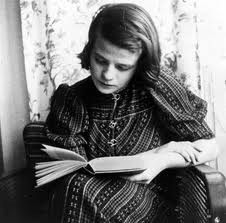It was February 22, 1943. Hans Scholl and his sister Sophie, along with their best friend, Christoph Probst, were together. Nazi officials had scheduled the three to be executed by guillotine that afternoon.
The young prisoners were calm and courageous as they faced their impending death. This made an impression upon their Nazi prison guards. Regulations were violated to permit them one last meeting before they were beheaded. Hans, a medical student at the University of Munich, was 24. Sophie, a student, was 21. Christoph, a medical student, was 22.
The following is a tale of The White Rose. It is a story of dissent, bravery, and honor.
Like many German teenagers in the 1930’s, Hans and Sophie Scholl joined the Hitler Youth. Adolf Hitler, they thought, was the man who would restore Germany and the German people to greatness.
However, Robert Scholl, their father, said that Hitler and the Nazis were leading Germany to destruction. In 1942, Robert would serve time in a Nazi prison for telling his secretary:
“The war! It is already lost. This Hitler is God's scourge on mankind, and if the war doesn't end soon the Russians will be sitting in Berlin.”
Over time, Hans and Sophie came to believe the same as their father…that Hitler was enslaving the German people in the name of freedom and the greater good of the German nation.
Once World War II started open dissent was impossible in Nazi Germany, Most Germans believed it was a matter of the duty to support the troops by supporting the government.
But Hans and Sophie Scholl believed that it was the duty of a citizen, even in times of war, to stand up against an evil regime, especially when it is sending hundreds of thousands of its citizens to their deaths.
The Scholl’s began talking about these beliefs with a small number of friends These were Christoph Probst, Alexander Schmorell, Willi Graf, as well as with Kurt Huber, their psychology and philosophy professor.
On a day in 1942, a leaflet appeared at the University of Munich. It was called THE WHITE ROSE. In it was an anonymously written essay. It declared that the Nazis had gradually imprisoned the German people. The Nazi regime was evil. It was time, the essay said, for Germans to arise and resist the tyranny of their government. At the bottom of the essay, the following request appeared:
“Please make as many copies of this leaflet as you can and distribute them.”
The contents of the leaflet blazed through the student body. This was the first time any internal dissent against the Nazi regime had surfaced in Germany. The writers and distributors of THE WHITE ROSE were Hans Scholl and his friends.
Soon more leaflets appeared. They totaled six in all…just six. Four were under the title “The White Rose” and two under the title “Leaflets of the Resistance.”
Their publication took place periodically between 1942 and 1943. Publication was interrupted briefly when Hans and his friends were sent to the Eastern Front to fight against the Russians.
The leaflets started coming in the mail. At the University of Hamburg students began copying and distributing them. Before long copies were turning up in many parts of Germany and Austria. The White Rose did not limit themselves to leaflets.
Graffiti began appearing in large letters on streets and buildings all over Munich: “Down with Hitler! . . . Hitler the Mass Murderer!” and “Freiheit! . . . Freiheit! . . . Freedom! . . . Freedom!”
It becomes quite clear from reading these pamphlets that, although it was forbidden to speak of these things, everybody was aware of the extermination policies regarding Jewish people. In one pamphlet they refer to the deaths of 300,000 Jews since the invasion of Poland.
The six members of the group proclaim that if, as a country, they don't want to be remembered as the embodiment of evil, they have to challenge the regime.
The Gestapo knew that the authors were having to procure large quantities of paper, envelopes, and postage and that they had access to a duplicating machine. But THE WHITE ROSE managed to avoid them.
They operated in secret, mailing the pamphlets to other cities for distribution and leaving the leaflets in deserted hallways of the university for students to find during breaks between classes.
Then, on February 18, 1943 when they discovered they had some left over in their case, they just dumped them out over an atrium from the top of a staircase. They were spotted and turned in. A search disclosed evidence of Christoph Probst's participation, and he too was soon arrested. The three of them were indicted for treason.
Their trial began four days after their arrest. Roland Freisler, chief justice of the People's Court of the Greater German Reich, had been sent from Berlin to be the presiding judge.
One author states, “He conducted the trial as if the future of the Reich were indeed at stake. He roared denunciations of the accused as if he were not the judge but the prosecutor.
He behaved alternately like an actor ranting through an overwritten role in an implausible melodrama and a Grand Inquisitor calling down eternal damnation on the heads of the three irredeemable heretics before him. . . .
No witnesses were called, since the defendants had admitted everything. The proceedings consisted almost entirely of Roland Freisler's denunciation and abuse, punctuated from time to time by half-hearted offerings from the court-appointed defense attorneys, one of whom summed up his case with the observation, “I can only say fiat justitia. Let justice be done.” By which he meant: Let the accused get what they deserve.”
When ask why they did this, Sophie Scholl remarked to Freisler:
“Somebody, after all, had to make a start. What we wrote and said is also believed by many others. They just don't dare to express themselves as we did.” Later in the proceedings, she said to him: “You know the war is lost. Why don't you have the courage to face it?”
Parents, Robert and Magdalene Scholl tried to enter the courtroom in the middle of the trial. Magdalene said to the guard: “But I'm the mother of two of the accused.” The guard responded: “You should have brought them up better.”
After forcing his way into the courtroom, Robert Scholl told the court that he was there to defend his children. He was forcibly ejected. The entire courtroom heard him shout: “One day there will be another kind of justice! One day they will go down in history!”
Roland Freisler pronounced his judgment on the three defendants: Guilty of treason. Their sentence: Death by beheading.
After being returned to Stadelheim prison, Hans and Sophie were permitted one last visit with their parents. Hans met with them first, and then Sophie. An eye witness writes:
“His eyes were clear and steady and he showed no sign of dejection or despair. He thanked his parents again for the love and warmth they had given him and he asked them to convey his affection and regard to a number of friends, whom he named. Here, for a moment, tears threatened, and he turned away to spare his parents the pain of seeing them. Facing them again, his shoulders were back and he smiled. . . .
Then a woman prison guard brought in Sophie. . . . Her mother tentatively offered her some candy, which Hans had declined. “Gladly,” said Sophie, taking it. “After all, I haven't had any lunch!” She, too, looked somehow smaller, as if drawn together, but her face was clear and her smile was fresh and unforced, with something in it that her parents read as triumph.
“Sophie, Sophie,” her mother murmured, as if to herself. “To think you'll never be coming through the door again!” Sophie's smile was gentle. “Ah, Mother,” she said. “Those few little years. . . .” Sophie Scholl looked at her parents and was strong in her pride and certainty. “We took everything upon ourselves,” she said. “What we did will cause waves.” Her mother spoke again: “Sophie,” she said softly, “Remember Jesus.” “Yes,” replied Sophie earnestly, almost commandingly, “but you, too.”
She left them, her parents, Robert and Magdalene Scholl, with her face still lit by the smile they loved so well and would never see again. She was perfectly composed as she was led away. Robert Mohr [a Gestapo official], who had come out to the prison on business of his own, saw her in her cell immediately afterwards, and she was crying. It was the first time Robert Mohr had seen her in tears, and she apologized. “I have just said good-bye to my parents,” she said. “You understand . . .” She had not cried before her parents. For them she had smiled. “
No relatives visited Christoph Probst. His wife, who had just had their third child, was in the hospital. Neither she nor any members of his family even knew that he was on trial or that he had been sentenced to death.
While his faith in God had always been deep and unwavering, he had never committed to a certain faith. On the eve of his death, a Catholic priest admitted him into the church in articulo mortis, at the point of death. “Now,” he said, “my death will be easy and joyful.”
Hans, Sophie, and Christoph were then allowed a last visit together.
Sophie was then led to the guillotine. One observer described her as she walked to her death: “Without turning a hair, without flinching.”
Christoph Probst was next.
Hans Scholl was last; just before he was beheaded, Hans cried out: “Long live freedom!”
The three students were brought to trial on February 22, 1943, 9am... The trial lasted until 1 pm and by 5 o’clock all are dead.
They were not the last to die. Later tried and executed were Alex Schmorell (age 25), Willi Graf (age 25), and Kurt Huber (age 49). The hundreds of students at the University of Hamburg were either executed or sent to concentration camps.
In the Scholls and their friends we see THE OTHER.
THE OTHER exists in all societies and in all times. What they were and what they did has been done before and will be done again.
The actions of these young people transcended and lifted them above the nationalism of time-bound events. They have become enduring symbols of the universal and timeless struggle for the freedom of the human spirit wherever and whenever it is threatened….thank God for them and their kind.

They are few, rare, and very much needed to remind humanity of the content of its soul.
 |
| Quote from the 4th Leaflet |



















I remember reading about the Scholls as a teenager and thinking how brave and honorable they were at such young ages... more young people could learn from their example... very powerful. thanks for the reminder....
ReplyDeletewow, someday i'll have time to learn more history. That is a great story. being brave is hard...we should all try harder.
ReplyDeleteas a mom, i'm too selfish to die for a cause, but i could do more...if only to be an example for my babies.
Humbled. God bless them.
ReplyDelete